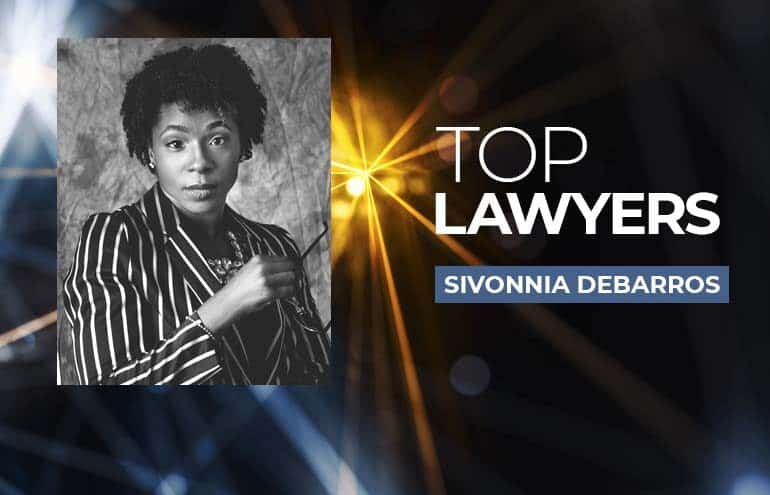What does it take to become a successful lawyer in your particular niche or practice area? In a series of in-depth interviews for the Estrin Report, Chere Estrin profiles top lawyers from all types of practices. In this column, we zero in on their top tips. This week, we feature “protector of athletes” Sivonnia DeBarros.
Sivonnia DeBarros
Founder
SL DeBarros Law Firm
Woodstock, IL
LinkedIn
Sivonnia DeBarros says her success has nothing to do with luck — she is self-made and confident in her abilities. Since passing the bar in 2013, DeBarros has built a six-figure law firm that focuses on sports and entertainment and has been featured in the news and on numerous podcasts. The “protector of athletes” represents pro athletes from the NFL, MLS, NBA-G League, Pro-Table Tennis sports, and high net-worth small business owners, creatives and employees.
Five Things You Need to Become a Top Lawyer
1. Shift to a growth mindset.
Success looks different for everyone. First, I’d advise that you take stock of what you want for your individualized future and what it will take for you to get there.
In America, less than 1% of all lawyers in associate attorney roles are women of color and of that 1%, only 0.38% are African American women. I wasn’t aware of this alarming statistic, but it didn’t surprise me knowing that I couldn’t recall knowing or seeing lawyers who looked like me growing up. I noticed that my success would not look like my former classmates who may have gotten an offer from a top law firm with a starting pay rate of $100,000. I had to build that for myself.
Along the journey of discovery and redefining my innate success came the task of “mindset shifting” to ensure that I didn’t sabotage everything that I had worked for. This shows up as “I’m not smart enough,” or “I don’t belong here,” or “I don’t have enough experience.” This limiting (“fixed”) mindset can keep you in a state of believing that “things just are what they are” and that it’s impossible to change your circumstances. Fixed mindsets do not breed success.
To get where I am today, I’ve had to constantly live in a “growth mindset,” knowing I can stretch and pull myself to discover what I don’t already know. To do that, I must be open and malleable to challenges that will present themselves along the way. You can do it, too.
2. Achieve through accountability.
For as long as I can remember, the phrase “you’re responsible for your own actions” has been a constant reminder that there is no achievement without accountability. Accountability is twofold: self-accountability and being accountable to others.
To become a top lawyer in your field, you must first be accountable to yourself. Are you going to do the work you’ve been paid to do? Are you going to show up even when you don’t want to? Are you going to take the initiative and schedule your court dates or client meetings? Are you going to research that legal issue to ensure preparedness and a sound knowledge of the law?
When I found the courage to represent athletes, no one was waiting to show me how to do it. I had to take the initiative. Do you know how frustrating it can be to leave law school, graduate with a 3.4 GPA, pass the bar exam on the first try, and still not have an employment offer? It is very frustrating. It’s the type of frustration that will make most people tuck their tails between their legs and hide behind a rock.
Through my frustration, I realized that no one owed me anything. Either I’m going to get up and fight for what I want or not. I decided on the former. Every day I showed up and practiced self-accountability by learning a new business skill during times I didn’t have any clients. That self-reliance and accountability has helped me garner the success I have today.
Then there’s accountability to others. Clients depend on us to solve their problems. We paid a high price to acquire knowledge and to learn how to navigate through the law with the hopes of helping people. Therefore, when someone hires you to do a job, they depend on you to show up and do the work.
If you want something bad enough, you’ll show up. And if you really, really want it, all you need to do is find a partner to hold you accountable. It reminds me of my track and field days. Although track and field is an individualized sport, we depended on teammates to perform their individualized events and compete in group races. When we combined the scores, it helped us to compete at a competitive level.
That is how the practice of law works. You are showing up to compete in your individualized race, but when you add the client preparation and their dependency on you, it all adds up to a competitive advantage.
3. Excel through education.
One thing I became impressed with when I was mature enough to notice was the education requirement that my mom implemented in our household. I always tell people that my mom gave me the gift of education and it’s true. I learned that education is freedom. It allows us to excel at anything if we do the simple work of educating ourselves on what we want to know and do. Education is also a trophy. No matter what harsh experiences you encounter, no one can take away your knowledge or the degrees that you’ve earned. There’s a lot of power in that.
When you feel that things are simply too hard for you, pause and find a resource to help better educate you in your field. A few of my law professors used to say years of practice do not equate to preparedness, and I’ve found that to be true. As a newbie attorney (with only two years under my belt at the time), I had to argue motions with million-dollar damages at stake against senior attorneys. Their 20-plus years had nothing on my level of preparedness because I took time to properly educate myself. Education and preparation can help you overcome a lot of things, but it’s up to you to dive in.
4. Find a qualified mentor.
I teach athletes that having a “qualified” mentor is extremely important. “Qualified” means your mentor is someone who has been working in the same or similar industry as you for many years — maybe they’ve watched you grow up, or maybe they have experience in helping people in personal development.
The same holds true for lawyers: Find someone who does what you do and does it well.
I was fortunate enough to find a great mentor. When I called his number by chance, I knew instantly that I needed him in my life. He talked to me for hours and then he said, “Sivonnia, Q-Tip.” I quietly asked myself, “Q-Tip. What the heck does that mean?” Then he said it: “Quit taking it personally. It’s business.”
Mentors are a gift that law school does not give you. If you allow yourself to be vulnerable and open to your mentors, they will help you to see where you’re making mistakes and where you can be better.
5. Understand your value.
As an African American woman, I fight daily against a particular stereotype. Rejection can chip away at how you feel about yourself. Regardless of the lack of employment offers after passing the bar exam, I knew I was qualified. I knew I was smart. But I get it; knowing you’re all of those things doesn’t lessen the sting you feel after being rejected.
You must do what it takes to rebuild your confidence so you can see and appreciate your own value. In his Netflix film, Colin Kaepernick said rejection helped him to recalibrate. I thought that was powerful! Rejection has nothing to do with who you are. Be on a quest to recalibrate and build your confidence so when you do get the client or the promotion you always wanted, you know how to sustain it.
Read the full Sivonnia DeBarros interview on Medium.
Subscribe to Attorney at Work
To get really good ideas every day for your law practice, subscribe to the Daily Dispatch newsletter.
















